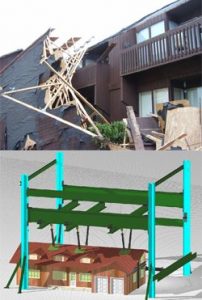Structural Engineering and Structural Mechanics

Top: Condo roof came off after 4 hrs of cycling.
Bottom: New spatio-temporal hurricane wind
test facility in the Structural Engineering Lab.
Structural Engineering deals with the planning, structural design, and construction of buildings, bridges, and other large structures, along with their maintenance, repair, and rehabilitation. Today’s structural engineer can choose from many materials, including timber, steel, masonry, concrete, and composites to provide economical and serviceable structures that are strong enough to resist gravity loads as well as dynamic forces from wind and earthquakes.
The Structural Engineering curriculum comprises a group of courses which help the student develop an understanding of the various techniques of analysis and design. Both theoretical and numerical techniques that are of use to the structural engineer are stressed along with the use of computer software. Courses in structural analysis and design form the core of M.S.-level instruction, while the Ph.D. curriculum includes a broad coverage of the field of structural engineering and solid mechanics.
Structural Mechanics is the study of material behavior under loads. It focuses on the determination of stress and strain distributions in solids when materials are used in engineering structures of any kind. Computational solid mechanics makes up the bulk of research conducted in this area, specifically research associated with new methods for the analysis of nonlinear material behavior, adaptive materials, and structural mechanics. An emphasis in Structural Mechanics leads the student into courses which stress the theoretical foundations of solid mechanics. A strong program in computational mechanics is provided. The curriculum includes closely related courses in geotechnical engineering, fluid mechanics, and mechanical engineering. Facilities utilized for structural mechanics include those described for structural engineering and for computational methods.
Graduate studies in Structural Engineering and Structural Mechanics at CSU typically consider topics such as:
- Response of Structures to Natural Hazards
- Transportation Safety Assessment and Improvement
- Reliability and Performance Based Design
- Health Monitoring and Structural Control
- Multiple-Hazard Risk Analysis and Reduction
- Fiber reinforced polymer composite applications
- Transportation Structures